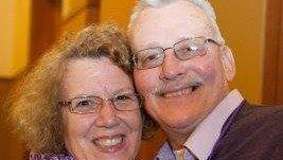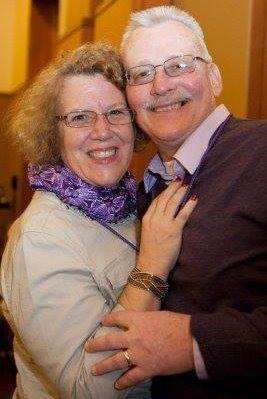
 In the fall of 2004, a local doctor told Ralph Cheney he had an “undiagnosed obstruction” in the tail of his pancreas after two bouts of pancreatitis. Local doctors wanted to wait and re-scan in six months. His wife Mariann said, “No way.” The couple went to a major center in New York with expertise in pancreas cancer. There, a gastroenterologist known for his skill in performing Endoscopic Ultrasounds told them he could not reach the tumor but had a hunch that it was cancer. Several months later in January 2005, Ralph had a distal pancreatectomy and spleenectomy and was diagnosed with ductal adenocarcinoma, Stage III.
In the fall of 2004, a local doctor told Ralph Cheney he had an “undiagnosed obstruction” in the tail of his pancreas after two bouts of pancreatitis. Local doctors wanted to wait and re-scan in six months. His wife Mariann said, “No way.” The couple went to a major center in New York with expertise in pancreas cancer. There, a gastroenterologist known for his skill in performing Endoscopic Ultrasounds told them he could not reach the tumor but had a hunch that it was cancer. Several months later in January 2005, Ralph had a distal pancreatectomy and spleenectomy and was diagnosed with ductal adenocarcinoma, Stage III.
After the devastating loss of Mariann’s sister to cancer in 1997 and then her sister’s husband Jim in early 2005, Mariann and Ralph made a commitment to each other that they were going to beat this disease and make sure that they were transparent about sharing their journey with everyone they came in contact with. According to Mariann, “It’s important that people know it’s possible to live happy and joyously even though there is a 500 pound gorilla in the living room.”
Right after Ralph’s surgery, the couple connected with the Pancreatic Cancer Action Network. Ralph was matched with a survivor to speak to who provided the wisdom of his own experience and hope throughout Ralph’s journey. The couple attended the Pancreatic Cancer Action Network’s Evening with the Stars event in 2005 and thus began their commitment to helping the Pancreatic Cancer Action Network in any way they could.
Ralph says, “I love my volunteer work. Taking calls from folks like myself who are filled with questions and who I can share my experience with has provided me a way to be useful. As Community Representatives, Mariann and I have participated in Advocacy Day in Washington as part of our continued commitment to help obtain the momentum needed for making pancreatic cancer research at the forefront of our leaders’ minds. Every day is a gift. Today, I’m an almost ten-year survivor, without evidence of pancreatic cancer. I am grateful, filled with hope and gratitude for the Pancreatic Cancer Action Network family and for the research commitment we must continue to be laser focused on.”
Mariann concurs, “Sharing our journey with patients and their families, listening to other’s concerns and walking the journey with people from all over the world has been a sometimes sad but ultimately joyful experience and we won’t stop our promise to get the funding we need until we reach our goal to double survival by 2020.”





